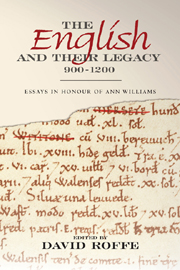Book contents
- Frontmatter
- Contents
- Figures and Tables
- Dedication
- Preface
- Contributors
- Abbreviations
- Ann Williams: a Personal Appreciation
- Life-writing and the Anglo-Saxons
- Meet the Swarts: Tracing a Thegnly Family in Late Anglo-Saxon England
- The Moneyers of Kent in the Long Eleventh Century
- Master Wace: a cross-Channel Prosopographer for the Twelfth Century?
- From Minster to Manor: the Early History of Bredon
- Eadulfingtun, Edmonton, and their Contexts
- The Family of Wulfric Spott: an Anglo-Saxon Mercian Marcher Dynasty?
- The Burial of King Æthelred the Unready at St Paul's
- Eustace II of Boulogne, the Crises of 1051–2 and the English Coinage
- Through the Eye of the Needle: Stigand, the Bayeux Tapestry and the Beginnings of the Historia Anglorum
- Robert of Torigni and the Historia Anglorum
- Invoking Earl Waltheof
- Hidden Lives: English Lords in post-Conquest Lincolnshire and Beyond
- Lordship and Lunching: Interpretations of Eating and Food in the Anglo-Norman World, 1050–1200, with Reference to the Bayeux Tapestry
- The Exchequer Cloth, c. 1176–1832: the Calculator, the Game of Chess, and the Process of Photozincography
- Ann Williams: a Bibliography 1969–2011
- Index
- Tabula Gratuloria
Master Wace: a cross-Channel Prosopographer for the Twelfth Century?
Published online by Cambridge University Press: 05 April 2013
- Frontmatter
- Contents
- Figures and Tables
- Dedication
- Preface
- Contributors
- Abbreviations
- Ann Williams: a Personal Appreciation
- Life-writing and the Anglo-Saxons
- Meet the Swarts: Tracing a Thegnly Family in Late Anglo-Saxon England
- The Moneyers of Kent in the Long Eleventh Century
- Master Wace: a cross-Channel Prosopographer for the Twelfth Century?
- From Minster to Manor: the Early History of Bredon
- Eadulfingtun, Edmonton, and their Contexts
- The Family of Wulfric Spott: an Anglo-Saxon Mercian Marcher Dynasty?
- The Burial of King Æthelred the Unready at St Paul's
- Eustace II of Boulogne, the Crises of 1051–2 and the English Coinage
- Through the Eye of the Needle: Stigand, the Bayeux Tapestry and the Beginnings of the Historia Anglorum
- Robert of Torigni and the Historia Anglorum
- Invoking Earl Waltheof
- Hidden Lives: English Lords in post-Conquest Lincolnshire and Beyond
- Lordship and Lunching: Interpretations of Eating and Food in the Anglo-Norman World, 1050–1200, with Reference to the Bayeux Tapestry
- The Exchequer Cloth, c. 1176–1832: the Calculator, the Game of Chess, and the Process of Photozincography
- Ann Williams: a Bibliography 1969–2011
- Index
- Tabula Gratuloria
Summary
The proposed title for this study, with due deference to Ann Williams, was ‘The English and the Norman Conquest – according to Wace’, but that implied yet another skirmish in the Hastings ancestry stakes or, perhaps, a Domesday database-style dot map of his inventive gazetteer of King Harold's towns and counties. However, the cultural re-orientation is intentional and, in the spirit of independent vernacular scholarship so well-represented by Wace (Magister was, surely, the equivalent of Doctor today), there is also a shift in time. His Roman de Rou is re-assessed as the source of an English prosopography for the twenty-year period between the accession of Stephen of Blois in 1135 and the first years of the reign of Henry II.
The purpose is to identify those of the so-called ‘Conqueror's Companions’ exclusive to Wace who occupy a no-man's land in surname history (albeit a vigorous virtual life). His work had been read as a tenurial mapping exercise but he was discredited – solely on the basis of the ‘1066’ section translated in 1837 – because so few of the personal or (presumed) locative names were found in the orthodox literature. Wace was the first to use the Anglo-Norman term surnons in what would now be considered a prosopographical context (lines 8659–60) and almost all of them correspond with twelfth-century hereditary English family names. This is more than a co-incidence of adopted feudal identifications: his neighbourhood contemporaries, either from choice or service obligation, were becoming ‘Domesday Descendants’.
- Type
- Chapter
- Information
- The English and their Legacy, 900–1200Essays in Honour of Ann Williams, pp. 61 - 78Publisher: Boydell & BrewerPrint publication year: 2012



